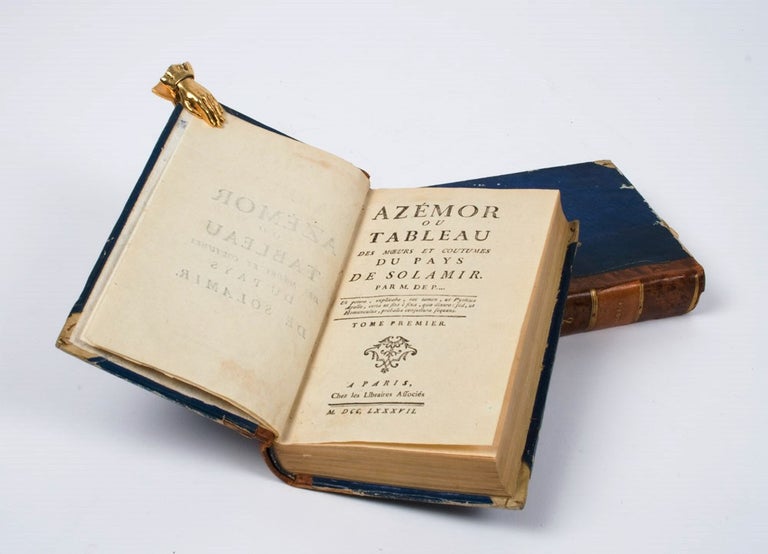Azémor ou Tableau des Moeurs et Coutumes du Pays de Solamir.
Paris: Chez les Libraires Associes, 1787.
Two volumes, duodecimo; contemporary French quarter calf.
Across Egypt with blind Tiresias
First and only edition: a rare account of a utopian kingdom reached by crossing Egypt to the south, one of the last such classical imaginary voyages published under the ancien régime.
First and only edition: a rare account of a utopian kingdom reached by crossing Egypt to the south, one of the last such classical imaginary voyages published under the ancien régime.
Unusually detailed and clearly the product of a thorough grounding in Greek literature, the novel recounts the African travels of young Azémor and his tutor Tiresias to a land where the vices of the world have never taken hold and where the people live in a state of harmonious peace, completely unlike the barbarous Americans. The title-page only gives the author's name as "M. de. P." now usually considered to have been the French soldier, historian and military tactician François Jacques Maximilien de Chastenet (1716-1782), marquis de Puységur. A career soldier with a small suite of tactical and political works to his name, his foray into imaginary voyaging comes as something of a surprise, but rests largely on his presumed authorship of Considerations sur l'influence des moeurs, dans l'état militaire des nations (1788), which is noted as 'by the author of Azémor.' The two works certainly go together (both show an expertise in classical Greece) but it is surprising that the publishers apparently sat on both for so long after de Chastenet's death in 1782.
Certainly the work is very rare, as can be guessed by the fact that it is one of the few eighteenth-century works missed by Gove. Only a handful of copies are listed in some of the grander northern hemisphere libraries.
Azémor was published in two volumes in Paris in 1787, the author identified only as "M. de P." However, recent research by Ray Howgego effectively confirms that the author was the French soldier, historian and military tactician François Jacques Maximilien de Chastenet (1716-82), marquis de Puységur (hence "M. de P."). This attribution is confirmed by a manuscript note inscribed in a single copy of another book by the marquis titled Considérations sur l'Influence des Moeurs dans l'État militaire des Nations ('London', i.e. Paris, 1788) and imprinted 'par l'auteur d'Azémor'. The note, inscribed on the back of the half title page, clearly attributes this book, and hence Azémor, to Chastenet.
Little is known of Chastenet's life except that he followed his more famous father into the army and was the recipient of numerous military honours, becoming maréchal de France, lieutenant general, and in 1782, the year of his death, commander of the royal and military order of St Louis. He died on 2 February 1782. His books include a study of Chinese military tactics, État actuel de l'art et de la science militaire à la Chine (Paris, 1773); a tactical study titled Art de la Guerre (Paris, 1748); and a critique of the place of the church in French society, Discussion intéressante sur la prétention du clergé d'être le premier ordre d'un État, which was censured by the authorities in 1768. His only novel, a 'roman sans aventure, et écrit avec esprit, par un homme du monde', was Histoire de Madame de Bellerive, ou, Principes sur l'amour et sur l'amitié ('London', i.e. Paris, 1768).
Not in Barbier; not in Gove.
Condition Report: Boards rubbed, some chipping to spines.
Price (AUD): $1,550.00
US$999.12 Other currencies


